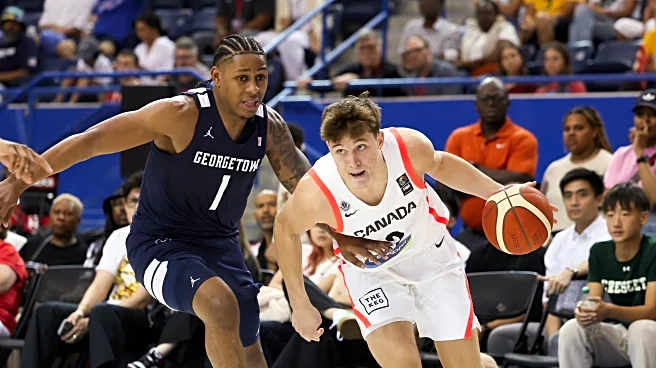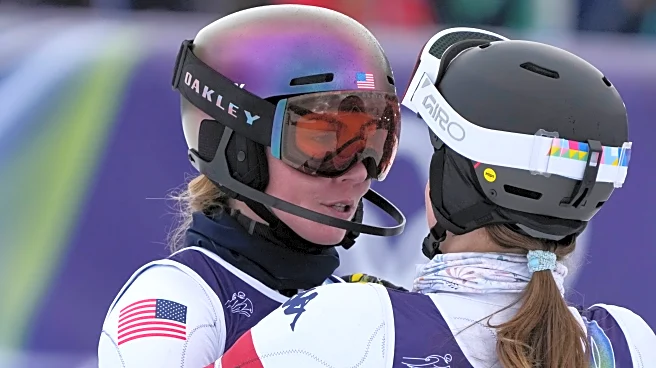With seconds winding down in the opening quarter, Canada’s Aden Holloway surveyed Japan’s transition defence as he sprinted up the court and attacked the basket.
His layup would touch every part of the
rim before rolling out. That’s when teammate David Simon appeared out of nowhere for the two-point offensive putback just in time before the buzzer, cutting Japan’s lead to one.
Timing is everything in basketball, and while the Canadians had it perfected in the latter portion of an 89-74 win over Japan, they ultimately ran out of time in their chase of a GLOBL JAM gold medal on Saturday.
With Georgetown defeating Brazil 76-74 earlier in the day, Canada (2-1) was eliminated from the championship game before they even took the court at the Mattamy Athletic Centre.
The Canadians looked sharper as the U23 tournament went on, but with only three games to decide the gold medal game, early miscues in their 85-78 loss to Brazil on Wednesday decided their fate.
Canada wouldn’t let another slow start determine an outcome as the home team overcame a 23-14 lead Japan built in the first quarter, a deficit that may have been a byproduct of the events earlier in the day.
“Your intensity level probably drops and it shouldn’t, but it does,” said Canadian head coach David Smart. It shouldn’t, I’ll say that 20 times, but it probably does because you know you’re not playing in the gold medal game.”
The comeback began when Canadian Aden Holloway came off the bench and knocked down the team’s first three-pointer at the 1:49 mark of the first. Holloway would score 12 of his game-high 18 points in the first half.
Holloway, who holds dual citizenship between Canada and the United States, and whose grandfather played in the NFL for the Cleveland Browns, had been a reliable source for points off the bench throughout the tournament. He previously led all bench players with 15 points against Brazil on Aug. 13 and scored eight in the contest against Georgetown on Aug. 14.
Canada steadied the ship offensively early in the second half with threes from Elijah Mahi and Xaivian Lee. The latter scored six third-quarter points, doubling his total from halftime.
Lee finished the tournament averaging 14.3 points, 7.3 assists, and 5.6 rebounds while shooting 46.8 per cent from the field. Like his team throughout GLOBL JAM, Lee required time before he found his rhythm. Despite struggling from the perimeter in his first two games (five-for-14), Lee made two of his five three-point attempts against Japan.
The Toronto-native’s progression from deep matches his output at Princeton, where he steadily improved during each of his three seasons, before reaching a personal best 36.6 per cent in his final season. Lee has committed to the Florida Gators for the 2025-26 NCAA season.
Canada held Japan to 30 points between the second and third quarters, a stark improvement after conceding 25 in the opening period.
“We got into it defensively and did some good things,” said Smart.
Canada also outrebounded Japan 61-35, capping the team’s dominance on the glass throughout the tournament. The Canadians won the rebounding battle in each of their three games.
A look ahead
GLOBL JAM concludes the men’s tournament with a gold medal matchup between Georgetown and Brazil on Sunday. Tip-off is set for 8:00 p.m. ET / 5:00 p.m. PT.
The rematch is the second time these two teams will clash in just over 24 hours. The final 60 seconds of their matchup, which ultimately knocked Canada out of the tournament, were a thrilling collection of sequences that highlight the potential classic Georgetown and Brazil could put together for a sequel.
Tied at 71 with under a minute remaining, Jayden Fort scored on a backdoor cut to give Georgetown a two-point lead. On the following possession, Brazil’s Gabriel Landeira answered by hitting a fall-away contested three-pointer to reclaim the lead.
Georgetown drew a foul on the next trip up the court and hit the first free throw before Brazil intentionally committed basket interference. This strategically triggered a technical foul to avoid overtime and potentially risk losing their three-way head-to-head point-differential advantage over Canada.











